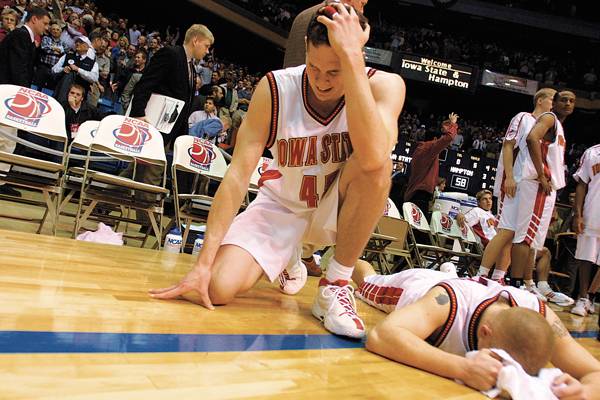Former Cyclone basketball player to talk mental illness at Iowa State

Justin Petersen File photo: Iowa State Daily
Iowa State players Paul Shirley (45) and Jake Sullivan show emotion after the 58–57 Iowa State upset loss to No. 15-seeded Hampton in the first round of the NCAA Tournament in Boise, Idaho, on March 15, 2001. The Cyclones were the No. 2 seed in the bracket.
September 15, 2019
Mental illness can affect all people, regardless of the position they hold or what point of their life they are in.
Former Cyclone basketball player Jake Sullivan will speak about his “battle with mental illness” 7 p.m. Monday in the South Ballroom of the Memorial Union.
Sullivan played basketball at Iowa State for four years, from 2000 to 2004, and was a three-time All-Big 12 selection, three-time Academic All-American and was voted to the Iowa State All-Century Team. Sullivan was also the top free-throw shooter in Iowa State and Big 12 Conference history, with 89.6 percent accuracy from the line.
During his time racking up achievements for basketball at Iowa State, though, Sullivan dealt with mental illness. Sullivan silently battled depression and obsessive compulsive disorder. During his lecture, Sullivan will discuss the “steps he took to navigate his challenges with mental illness” and the “importance of recognizing that mental illness can affect anyone.”
Tens of millions of Americans have diagnosable depression of various types, impacting nearly 10 percent of the population, according to the Anxiety and Depression Association of America. Roughly two to three million Americans are affected by obsessive compulsive disorder, according to the International OCD Foundation.
An hour prior to Sullivan’s speech, a mental health resource fair will provide community resources and practical, everyday tools to “more fully understand and manage mental health and recovery issues.”
Representatives from ISU Police Department and Student Health and Wellness will be available to provide information about on-campus resources in a question and answer session after Sullivan’s speech.
Story County Mental Health Expo, the National Alliance on Mental Illness on Campus and the Committee on Lectures are co-sponsoring the lecture.
















